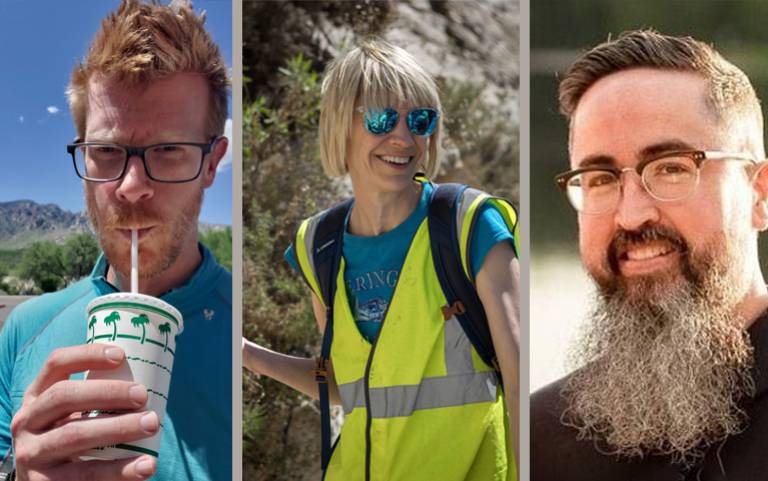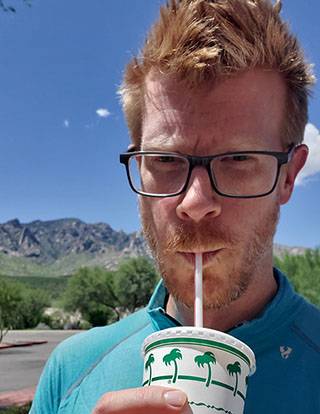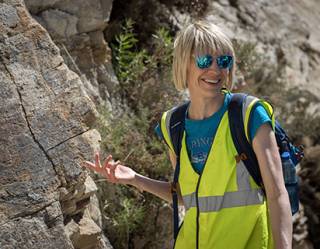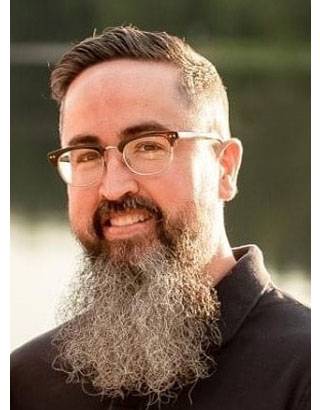Introducing new staff members
7 March 2023
Welcome aboard new members of our academic staff: Dr Byron Adam, Dr Frances Cooper and Dr Brian Thomas. We are delighted to have you join our department!

Meet our new Colleagues:

Dr Byron Adams.
Despite growing up in southern California on top of the San Andreas Fault and in the shadow of the San Gabriel Mountains, it wasn’t until I moved to the flat cornfields of Indiana that I found geology. That’s not really the full story, but an important part of my journey was the undergraduate geology program at Ball State University in Muncie, Indiana. After that, I was eager to leave the Midwest, but instead found myself in nearby Ohio at the University of Cincinnati, pulled by the allure of starting an MS project in the Indian Himalaya. This research propelled me to move to Arizona State University to begin a PhD focusing on the eastern Himalaya in Bhutan. After seven years (yep, PhDs in the US are no joke), I began a postdoc position at the University of Tübingen in Germany. Ironically, despite now living outside of the USA, my field area was the Olympic Mountains in Washington State, where I studied the postglacial adjustment of the mountain range. In 2016, I moved to the University of Bristol where I first held an AXA Fellowship and then a Royal Society Dorothy Hodgkin Fellowship, which I have now brought over to UCL.
Research:
My research focuses on the evolution and function of Earth’s surface and particularly how the complex and competing influences of climate, tectonics, surface processes, and volcanism have shaped landscapes around the world. Understanding the past, present, and future of this critical interface, often referred to as the critical zone, between the hydrosphere, cyrosphere, biosphere, lithosphere, and atmosphere is vital for sustaining the habitability of Earth and improving the lives of those who dwell there. Using field observations, geochemical analyses, multi-modal remote sensing, computer vision, and numerical modelling, I seek to predict long-term (million-year) landscape responses to external perturbations and short-term (decadal) natural hazards.
Teaching:
I will be taking over GEOL0066 Meteorological and Hydrogeological Hazards and can’t wait for the day that I hear students casually debating in common spaces around the Department about the appropriate factory of safety of hillslopes. Dr Byron Adams' academic profile

My story began here in this very department at the turn of the last century when, fresh from my “gap yah”, I moved into a room (shoebox) in Astor College on Charlotte Street and embarked on a memorable 4-year MSci in Geology. I am thrilled to have returned all these years later as a member of staff and am excited to contribute to the department that gave me such a great start to my career. After my degree, I hopped across the pond to Los Angeles to do a PhD at the University of Southern California and stayed over there for another 4 years as a postdoc at Arizona State University. Britain (pre-Brexit) eventually lured me back and I moved to the University of Bristol in 2012 where I stayed until UCL came knocking once again…
Research
My research seeks to understand the mechanics of large-scale continental deformation, the evolution of orogenic systems, and the role of tectonics in ore formation. Over the years, this has taken me around the globe from studying active normal faulting in the Gulf of Corinth, Greece (this was my UCL MSci project), to constraining the evolution of metamorphic core complexes in the Basin and Range province, USA, to investigating the role of extension in the Bhutan Himalaya. Over the past decade or so, I have been involved in a project funded by the mining company, BHP, to understand how tectonics, magmatism, volcanism, and landscape evolution combine to control the formation, enrichment, and preservation of copper deposits, particularly in northern Chile and – more recently – in the western USA. I use a multidisciplinary approach – rooted in good old fashioned field geology – which includes structural geology, igneous and metamorphic petrology, isotope geochemistry, geochronology, thermochronology, remote sensing, and thermal modelling. I am, therefore, looking forward to becoming an active member of the London Geochronology Centre and hope to develop many new collaborations across the department!
Teaching
My teaching kicked off in April when I joined the team leading the Betics field trip. It was a lot of fun and also rather surreal to return there exactly 20 years after I did the same trip as an undergrad with the one and only Jürgen! As well as being a regular fixture on that trip, I will be introducing a new 2nd year module next year called “Introduction to Mineral Resources”. The aim of this is to provide students with a broad overview of the various types of ore deposits, how they form, where they can be found, and the challenges we face in sourcing them in an environmentally sustainable way. Dr Frances Cooper's academic profile

I’m the new “groundwater guy”, having made the transition to UCL via Newcastle University and the University of Pittsburgh. I previously served as the Degree Programme Directors for the MSc in Hydrogeology and Water Resources at Newcastle University. At UCL, I am the module organizer for Groundwater Science.
My research combines data analytics and remote sensing to understand subsurface water change. My work extends across the globe (Uganda, Egypt, India, Peru, USA) to learn how auxiliary datasets can help us to understand the role of groundwater processes and watershed storage in surface water behaviors as a result of the convolution of climate and anthropogenic influences. Dr Brian Thomas's cademic profile
 Close
Close

